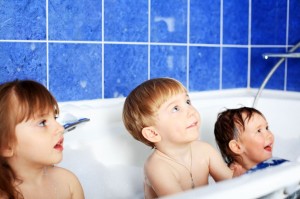 Bathroom safety for young children can be complicated and problematic. It is suggested that infants and toddlers should never be left alone in the bathroom and that the door should be kept closed and locked to keep them out. However, this not only interferes with potty training, it can create a sense of false security in which adults and older children become careless about leaving the bathroom in a hazardous state for little ones who may slip in when you least expect it.
Bathroom safety for young children can be complicated and problematic. It is suggested that infants and toddlers should never be left alone in the bathroom and that the door should be kept closed and locked to keep them out. However, this not only interferes with potty training, it can create a sense of false security in which adults and older children become careless about leaving the bathroom in a hazardous state for little ones who may slip in when you least expect it.
- Whether you choose to lock your child out or not, take the time to childproof every bathroom in your home.
- Install toilet locks to prevent drowning.
- Make sure that sinks and tubs drain properly. A child can drown in just two inches of standing water.
- Never leave a child unattended in the bath, not even for a second. Special equipment for bathing babies makes the job easier, but it will not prevent drowning.
- Keep the temperature on your hot water heater no higher than 120 degrees to prevent scalding.
- Electrical grooming appliances, such as hairdryers and electric razors should always be unplugged ad put away when they are not in use. They can pose burn, electrocution, and strangulation hazards.
- You know to keep all medicines out of reach and in a locked cabinet.
- You should do the same with cosmetics and toiletries such as shampoo, deodorant, sunscreen, lotions, and soaps. These can also poison your child.
- Don’t forget the trash. Used razors, feminine hygiene products, and dental floss are just a few of the hazards commonly found in bathroom wastebaskets.
- If your bathroom door locks from the inside, have a way to unlock it from the outside in case your child accidentally locks himself in.















